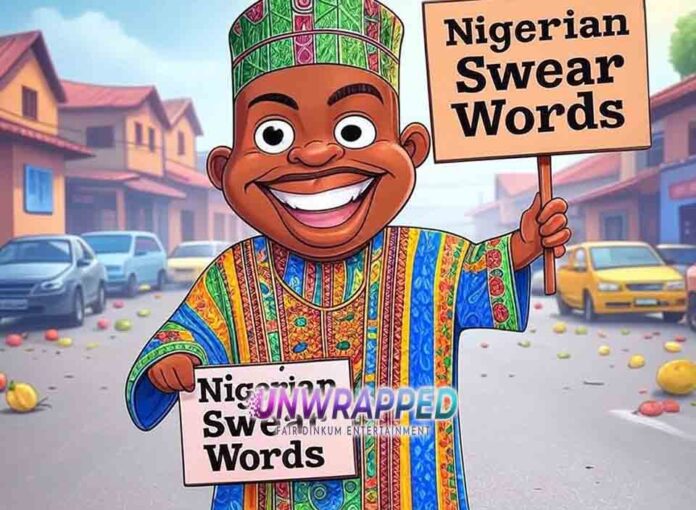Nigeria, a country rich in cultural diversity and linguistic variety, is home to vibrant expressions that reflect the humor and passion of its people. Nigerian swear words and insults often combine creativity, directness, and humor, with influences from English, Pidgin, Yoruba, Hausa, Igbo, and other local languages. Whether you’re stuck in Lagos traffic, debating football, or joking with friends, Nigerian profanity adds spice to the conversation. Here’s your guide to Nigerian swearing, ranked from strongest to weakest.
Nigerian Swear Words: Ranked Strongest to Weakest
The Strongest Swear Words in Nigeria
1. Thunder Fire You
The Ultimate Curse
“Thunder fire you” is one of the most iconic and extreme Nigerian insults. It’s essentially wishing someone divine punishment or calamity.
- Example:
- “Thunder fire you and your wahala!” (May thunder strike you and your troubles!)
- “If you try me, thunder go fire you!” (If you cross me, thunder will strike you!)
- Pro Tip: This is a strong curse and can escalate conflicts quickly—use with caution.
2. Your Papa/Mama
The Personal Insult
Insulting someone’s parent, such as “your papa” (your father) or “your mama” (your mother), is one of the most offensive things you can say in Nigerian culture.
- Example:
- “Your papa na goat!” (Your father is a goat!)
- “Your mama no sabi anything.” (Your mother doesn’t know anything.)
- Pro Tip: Family-based insults are deeply personal and can lead to serious confrontations.
3. Oloshi
The Yoruba Slam
“Oloshi,” meaning “useless person” or “wretched soul” in Yoruba, is a harsh insult to demean someone.
- Example:
- “You be oloshi, no get sense!” (You’re a useless person, no sense!)
- Pro Tip: Common in the southwest, it’s cutting but also widely used in jokes.
Mid-Tier Nigerian Insults (Still Pack a Punch)
4. Mumu
The Foolish Insult
“Mumu,” meaning “fool” or “idiot,” is a common insult used to call out someone’s lack of intelligence or awareness.
- Example:
- “You be mumu? Why you do am like that?” (Are you stupid? Why did you do it like that?)
- “That mumu no fit understand.” (That fool won’t understand.)
- Pro Tip: While offensive, it’s often used playfully among friends.
5. Ode
The Yoruba Fool
“Ode,” meaning “fool” or “idiot” in Yoruba, is another popular insult for someone acting stupidly.
- Example:
- “Stop behaving like an ode!” (Stop behaving like an idiot!)
- Pro Tip: It’s less harsh than “oloshi” but still insulting.
6. Akpakpa
The Insult for Laziness
“Akpakpa,” often used in Igbo, means “useless” or “good-for-nothing” and is directed at someone lazy or incompetent.
- Example:
- “You just dey sit down like akpakpa!” (You’re just sitting around like a useless person!)
The Playful and Milder Swears
7. Ewu
The Animal Insult
“Ewu,” meaning “goat” in Igbo, is a mild insult often used to describe someone as foolish or clumsy.
- Example:
- “You be ewu for doing that nonsense!” (You’re a goat for doing that nonsense!)
8. Shege
The Hausa Slam
“Shege,” meaning “bastard” or “rascal” in Hausa, is a versatile insult often used jokingly or seriously.
- Example:
- “Kai, shege, stop that!” (Hey, rascal, stop that!)
- Pro Tip: Can be offensive or playful depending on tone and context.
9. Bastard
The Imported Insult
“Bastard” is widely used in Nigerian English and Pidgin to insult someone for being despicable or untrustworthy.
- Example:
- “That man na bastard for what he did.” (That man is a bastard for what he did.)
10. Waka
The Rude “Walk Away”
“Waka,” meaning “go away” or “walk off,” is a mild insult often accompanied by a rude hand gesture.
- Example:
- “Waka, I no get time for you!” (Get lost, I don’t have time for you!)
- Pro Tip: It’s mild but can come across as disrespectful.
Honorable Mentions
- Yeye: “Silly” or “ridiculous.”
- Gerrout: Pidgin for “get out.”
- Ashawo: “Prostitute” (a gendered insult often used for women).
Swearing Pro Tips
- Family-Based Insults Are Serious: Insults like “your papa” or “your mama” are deeply personal and can lead to serious confrontations in Nigerian culture.
- Tone Is Key: Words like “mumu” and “ode” can sound playful or harsh depending on delivery.
- Combine for Effect: Mix words for more impact—e.g., “You be mumu oloshi!” (You’re a stupid, useless person!).
Bonus Word: “Jollof”
Not a swear word, but quintessentially Nigerian, “Jollof” refers to the nation’s beloved rice dish. It’s often used humorously in debates about food.
- Example:
- “Naija Jollof is the best, no cap!” (Nigerian Jollof is the best, no argument!)
Conclusion
Nigerian swearing is as vibrant and expressive as the country itself. From the fiery “thunder fire you” to the playful “mumu,” these words capture the humor, frustration, and creativity of Nigeria’s many languages and cultures. Whether you’re joking or venting, Nigerian profanity is your toolkit. Use them wisely—and good luck (Wahala no dey!).
See Also: Finnish Swear Words: Ranked Strongest to Weakest (X-Rated)











